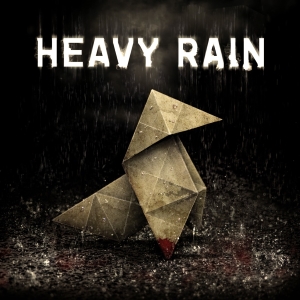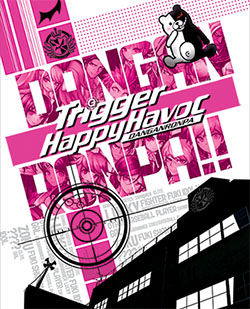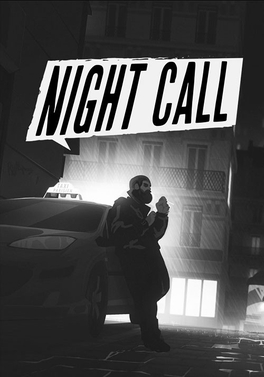
Heavy Rain is a 2010 action-adventure video game developed by Quantic Dream and published by Sony Computer Entertainment. The game features four protagonists involved with the mystery of the Origami Killer, a serial killer who uses extended periods of rainfall to drown his victims. The player interacts with the game by performing actions highlighted on screen related to motions on the controller, and in some cases, performing a series of quick time events. The player's choices and actions during the game affect the narrative.

L.A. Noire is a 2011 action-adventure video game developed by Team Bondi and published by Rockstar Games. Set in 1947 Los Angeles, the game follows detective Cole Phelps's rise among the ranks of the Los Angeles Police Department as he solves a range of cases across various bureaus. When he is tasked with investigating a morphine distribution ring involving several of his former squadmates from World War II, Phelps finds both his personal and professional life falling into turmoil, and reluctantly joins forces with his estranged former comrade, Jack Kelso, as they uncover a major conspiracy involving prominent Los Angeles figures.

A hidden object game, also called hidden picture or hidden object puzzle adventure (HOPA), is a subgenre of puzzle video games in which the player must find items from a list that are hidden within a scene. Hidden object games are a popular trend in casual gaming. Time-limited trial versions of these games are usually available for download, although many are free to download on app stores. Popular themes include detective crime stories, adventure, gothic romance, and mystery.

Lego Indiana Jones 2: The Adventure Continues is a 2009 action-adventure video game developed by Traveller's Tales and published by LucasArts. Based on the Indiana Jones franchise, it is the sequel to the 2008 video game Lego Indiana Jones: The Original Adventures. It was released for the Wii, Xbox 360, PlayStation 3, and Microsoft Windows; Feral Interactive published a version for Mac OS X in 2011. TT Fusion developed a handheld version for the Nintendo DS and PlayStation Portable that, although released under the same name, is different in gameplay and amount of content.

Again: Interactive Crime Novel, known in Japan as Again: FBI Chōshinri Sōsakan, is a mystery adventure video game developed by Cing and published by Tecmo for the Nintendo DS. It was released in Japan on December 10, 2009 and in North America on March 30, 2010.

Paper Mario: Sticker Star is a 2012 role-playing video game developed by Intelligent Systems and published by Nintendo for the Nintendo 3DS. It is the fourth installment in the Paper Mario series and part of the larger Mario franchise; it is the first game in the series released on a handheld console. In the game, the protagonist Mario and a new ally named Kersti travel across the Mushroom Kingdom to retrieve the six Royal Stickers scattered by Bowser. The game was released in November 2012 in North America and December 2012 overseas.

Layton Brothers: Mystery Room is a puzzle adventure video game for iOS and Android, published by Level-5. It is a spin-off of the Professor Layton series, following rookie investigator Lucy Baker, who works with genius detective Alfendi Layton, son of Hershel Layton, in a special department of Scotland Yard's crime investigation unit known as the "Mystery Room". The game was released in Japan on September 21, 2012, and in English on June 27, 2013. An Android version was released on September 5, 2013.

Danganronpa: Trigger Happy Havoc is a visual novel adventure game developed and published by Spike as the first game in the Danganronpa series. The game was originally released in Japan for the PlayStation Portable in November 2010 and was ported to Android and iOS in August 2012. Danganronpa was localized and published in English regions by NIS America for multiple platforms.

Sherlock Holmes: Crimes & Punishments is an adventure mystery video game in the Sherlock Holmes series developed by Frogwares in 2014 and distributed by Focus Home Interactive from 2014 to 2019 for Microsoft Windows, PlayStation 3, PlayStation 4, Xbox 360, and Xbox One. Frogwares regained the publishing rights to the title on Steam and the game reappeared on other platforms in the start of 2020. A Nintendo Switch version was released on February 3, 2022.
Pirates of the Caribbean: Armada of the Damned is a cancelled action-adventure role-playing video game that was being developed by Propaganda Games for the PlayStation 3, Xbox 360, and Microsoft Windows platforms. Originally set to be published by Disney Interactive Studios, it was the first attempt to create an open world game based on the Pirates of the Caribbean film franchise. The project was cancelled in October 2010, soon before the closure of Propaganda Games.

Detroit: Become Human is a 2018 adventure game developed by Quantic Dream. The plot follows three androids: Kara, who escapes her owner to explore her newfound sentience and protect a young girl; Connor, whose job is to hunt down sentient androids; and Markus, who devotes himself to releasing other androids from servitude. The player's choices affect the course and outcome of the story.

Layton's Mystery Journey: Katrielle and the Millionaires' Conspiracy is a 2017 puzzle video game by Level-5. It is the seventh main entry in the Professor Layton series and follows a new protagonist, Katrielle Layton. It was released for Android, iOS, and the Nintendo 3DS, in 2017, and an enhanced port for the Nintendo Switch in Japan in 2018, and worldwide in 2019. A manga adaptation of the game drawn by Hori Oritoka began serialization on March 20, 2018, in Shōgakukan's Ciao magazine, and an anime adaptation, Layton Mystery Tanteisha: Katori no Nazotoki File, began airing on Fuji TV and other channels in April 2018.

Compulsion Games Inc. is a Canadian video game developer and a studio of Xbox Game Studios based in Montreal. Established in 2009 by ex-Arkane Studios developer Guillaume Provost, the studio developed the 2013 puzzle-platform game Contrast and the 2018 survival horror game We Happy Few.

Hidden Agenda is a 2017 action-adventure game developed by Supermassive Games and published by Sony Interactive Entertainment. It was released on 24 October 2017 for PlayStation 4.

Virtual Murder, renamed as Murder Mystery is a four-part murder mystery adventure video game series developed by Creative Multimedia Corporation. The games were released in 1993 and 1994 for Macintosh and Windows PCs.

The Awesome Adventures of Captain Spirit is a demo adventure game in the Life Is Strange series developed by Dontnod Entertainment and published by Square Enix. It was released in June 2018 for PlayStation 4, Windows, and Xbox One as an introduction to Life Is Strange 2. The plot follows Chris Eriksen, a young boy who creates the superhero alter ego Captain Spirit to deal with the loss of his mother. Square Enix External Studios worked with Dontnod for the development. The game received generally favourable reviews, praising the narrative, main character, and script, but criticising the game mechanics and aspects of the writing.

Judgment is an action-adventure video game developed by Ryu Ga Gotoku Studio and published by Sega. A spin-off to the Yakuza series, it was released for the PlayStation 4 in December 2018 in Japan and June 2019, worldwide. A remastered version of the game, with the subtitle Remastered in Japan and Asia, was released for the PlayStation 5, Stadia, and Xbox Series X and Series S in April 2021. A port for Amazon Luna was made available on December 16, 2021. A Windows port was released on 14 September 2022 through Steam. Judgment follows lawyer-turned-detective Takayuki Yagami and his allies as they explore a case involving corpses whose eyes have been removed. The player controls Yagami in the fictional Tokyo district of Kamurocho, where he fights thugs and yakuza while carrying out missions involving chasing, stealth, and searching for clues.
Scribblenauts is a series of action puzzle video games primarily developed by independent studio 5th Cell. The series is owned and published by Warner Bros. Interactive Entertainment. The first game in the series was titled Scribblenauts and was first released on September 15, 2009, in North America, exclusively on the Nintendo DS. Since the release of the first game, five other Scribblenauts games have been released, in addition to two compilations and two comic adaptations.

Night Call is a 2019 noir-inspired adventure video game, co-developed by MonkeyMoon and Black Muffin, and published by Raw Fury. It was released worldwide on July 17, 2019, for PC platforms, and on June 24, 2020, for Xbox One and the Nintendo Switch. In Night Call, player assumes the role of a Parisian taxi driver who survived the actions of a serial killer, and is compelled to solve a murder mystery following his awakening from a coma. Aside from pursuing interactions with the driver's passengers as the conceit behind the investigation, the gameplay of Night Call also incorporates aspects of a management simulator, which reflects Houssine's need to make a living as a taxi driver.

Chicken Police: Paint it Red! is a point-and-click adventure game developed by The Wild Gentlemen. HandyGames released it in 2020 for multiple platforms. Players control a burnt-out cop who is investigating a crime in a city of anthropomorphic animals.



















